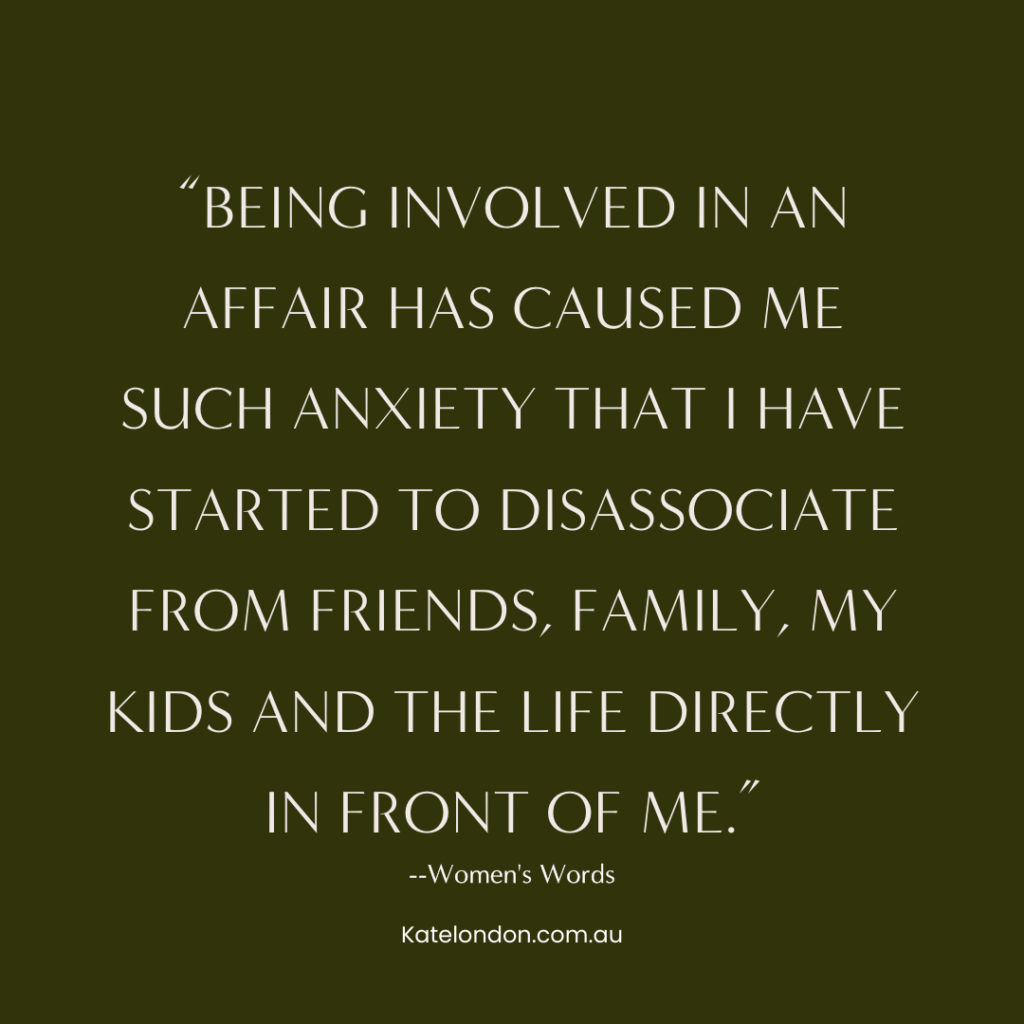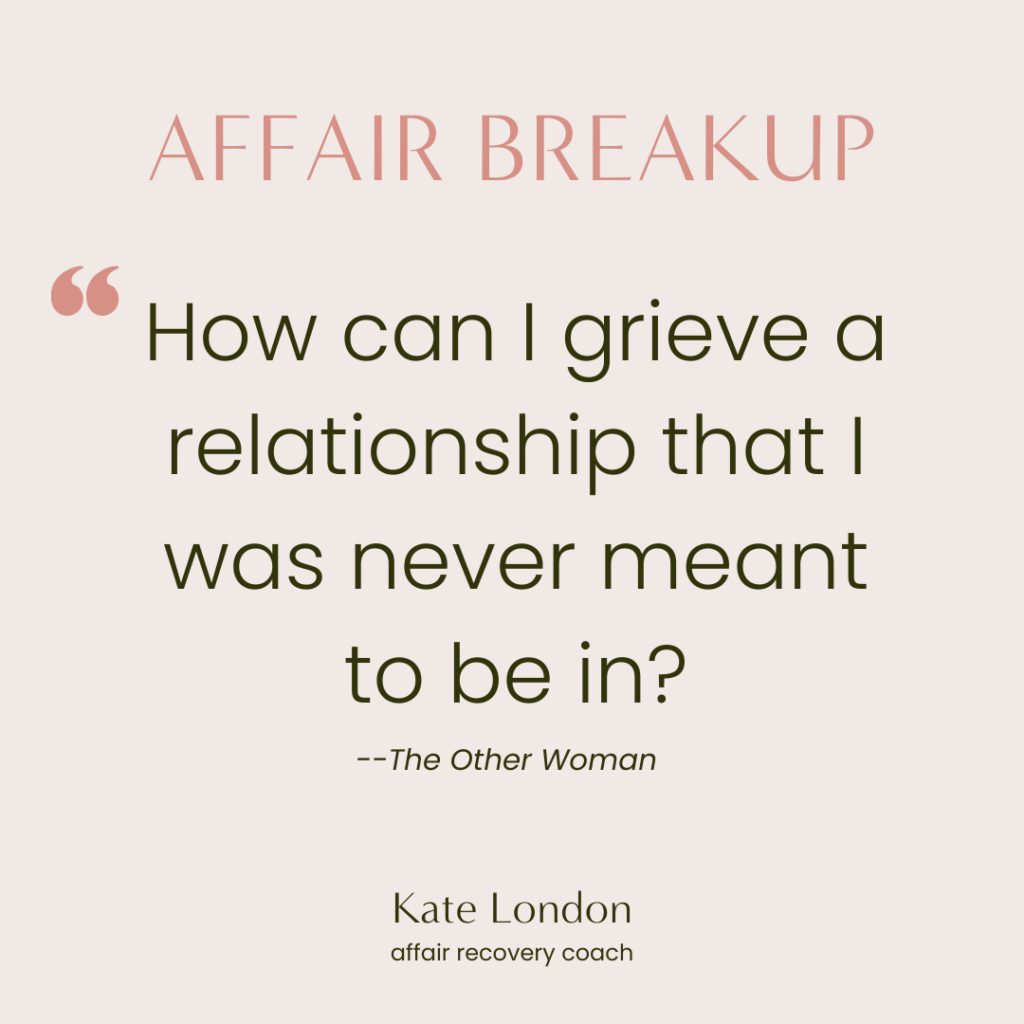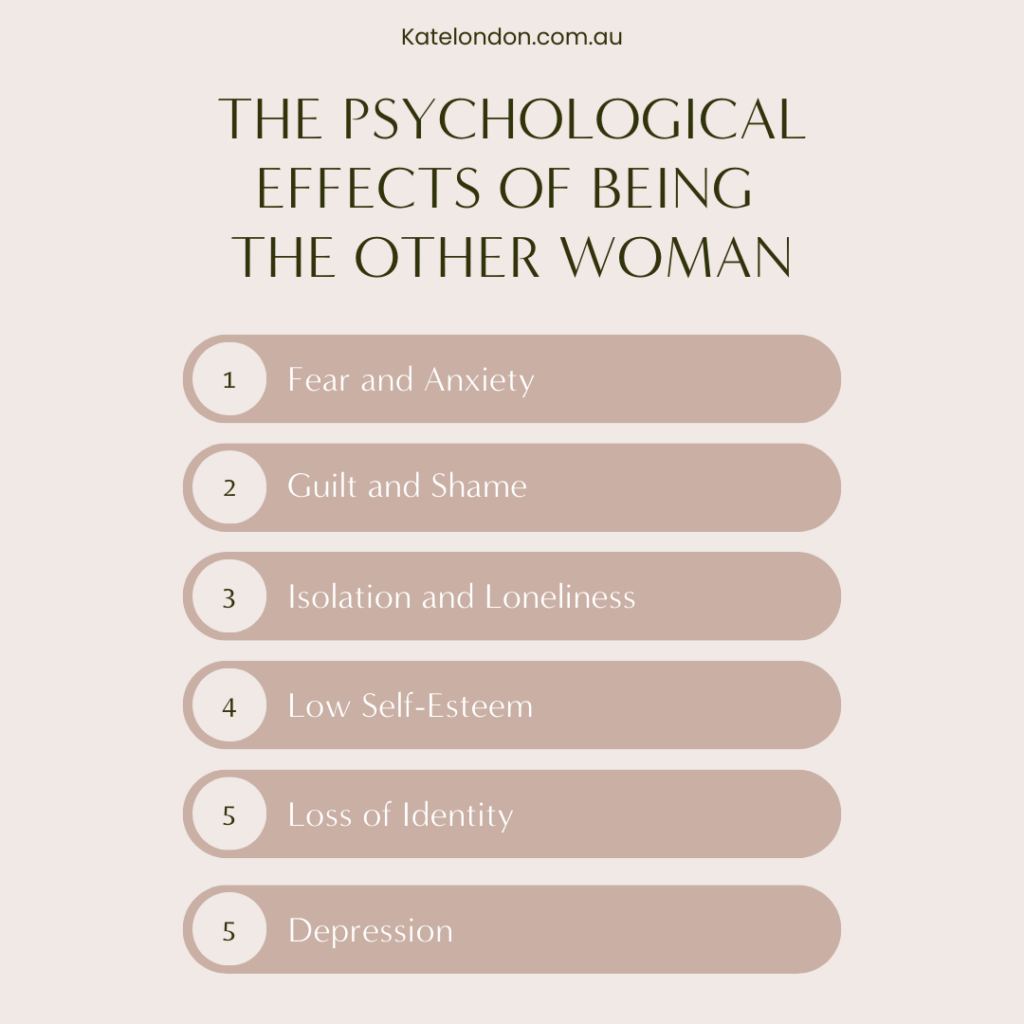The Psychological Effects of Being the Other Woman
What are the psychological effects of being the other woman? Being in an affair with a married man creates a complex mental and emotional landscape to navigate, and this cocktail of emotions can make way for long-lasting internal struggles that may even outlast the relationship itself.
“I don’t know who I am anymore.”
In this post we’ll explore what it’s like to be the other woman, including how it can impact your mental and emotional wellbeing. If you relate to the experiences shared here, you’ll also learn where you can find support where you feel understood for the depth of what you are going through.
“The affair relationship impacted every aspect of my emotional wellbeing and began to erode it. I entered into the relationship a relatively grounded, ambitious, optimistic and trusting young woman, and as the relationship progressed I began to lose trust in myself, my intuition, in other people, and in life.
So much of my emotional energy went into the pain management of the affair relationship, such that outside of it I was a shadow of my former self. I was in survival mode, on automatic pilot in all of my other relationships.” — Community Member
5 Common Psychological Effects of Being the Other Woman
Keeping a secret relationship can be a heavy burden to bear, so over time it’s bound to have an impact on you in one way or another. Before we jump into how being a mistress effects mental health, it’s important to remember that your situation is unique, so you may experience only some of these particular challenges.
No matter what your specific experience looks like, your feelings are valid. Understanding and normalizing the lasting psychological effects of being in an affair relationship is the first step to engaging in the healing process.
Now, let’s explore some common experiences women go through when in a relationship with a married man.
Fear and Anxiety.
In the beginning, the relationship with your affair partner (AP) felt exciting. The secrecy, the stolen moments, and the allure of forbidden love can create an adrenaline rush. Not to mention him confiding in you, and you feeling like you are the one woman who truly sees him for all that he’s going through.

But eventually, as those feelings of excitement, newness, and uncertainty in the early days of a relationship begin to subside, you realise that although the thrill of the unknown can feel alluring, a relationship built on uncertainty fills you with fear and anxiety.
This anxiety can stem from different aspects of your relationship. On one side, you may develop a fear of abandonment, or anxiety around how your AP really feels about you. This uncertainty can permeate all the other parts of your life and begin influencing you outside of the relationship—for instance in your friendships, family life, or at work.
This is especially true if you work with the married man you’re seeing. Additionally, there is always an undercurrent of awareness that your relationship must be kept a secret. Your affair could be exposed at any moment—and waiting for the resulting fallout is never a good feeling, whether it actually comes to that point or not.
“Being involved in an affair has caused me such anxiety that I have started to disassociate from friends, family, my kids and the life directly in front of me.” — Woman’s Words
Guilt and Shame.
If you really want to narrow down how the other woman feels in an affair, look no further than the stigma endured by women in this position in today’s world. While society generally frowns upon extramarital affairs, no one is judged quite as harshly as the other woman. Women in relationships with married men are often called the worst names imaginable.
As the other woman in an affair, you’re quick to be unfairly labelled without any understanding of your unique situation. This enforces a sense of shame that makes it difficult to seek support or reach out. You may also carry guilt for your AP’s family, knowing that your relationship is being kept secret from them too.
Isolation and Loneliness.
Being the other woman often comes with a deep sense of isolation. When you’re in a relationship that is built on secrecy, you’re much less likely to confide in or find support from your family and friends. This is true during your relationship, but it’s common for these feelings to continue if or when the affair ends, too. After all, when you break up with your affair partner, we often ask ourselves “How can I grieve a relationship that I was never meant to be in? How can I get over a man I was never fully with?”
Whatever stage of the affair you are at, you’ve been on an emotional rollercoaster, yet you’re left to grapple with your experiences in solitude.
You may also experience isolation due to a lack of public recognition. For some women, they miss out on all the experiences they dream of having with their partner—from date nights to dinners out, and celebrating big events or holidays together. When your relationship has to stay hidden, you miss out on enjoying these moments together, which can feel deeply invalidating.

Low Self-Esteem.
The clandestine nature of an affair can take a toll on your self-esteem. Constantly being in the shadows and hidden from public view may lead you to question her own worth and desirability. You may even question what you could do to be “good enough” to gain your affair partner’s commitment—or at the very least more of their attention.
If this resonates with you, remember that the way your affair partner treats you is a reflection of them, and not of you. You are good enough—and you always have been. As difficult as it is to struggle with your self-esteem, know that many women in similar relationships feel just the same.

Loss of Identity.
During your affair relationship, you may find you no longer recognise the person you once were. You may be feeling this deeply if you’ve become overly focused on the needs and desires of your affair partner, at the cost of neglecting your own well-being and personal growth.
Keeping the connection becomes your top priority—and what’s important to you and your identity falls away. This can contribute to a loss of individual identity, as your sense of self becomes intertwined with the dynamics of your relationship.
“Quite simply, I lost the woman I had previously been. She faded away over the years, and I became unrecognisable to myself. I could no longer feel inspired about the future, or excited about making plans for it. I firmly believe that being in a relationship that requires you to be invisible will pervade every aspect of your life and being.” — Woman’s Words
Depression.
Over time, being in an affair relationship can lead to depression. While this can be difficult to come to terms with, the truth is that anyone in your situation has the potential to experience depression. Dealing with a lack of commitment, loneliness, anxiety, isolation, and all of the other complex feelings that come with being in an affair relationship takes an overwhelming emotional toll. You’ve been through a lot, so don’t be too self-critical if you recognize this in yourself.
In some cases, feelings of depression may be exacerbated due to exposure to emotional abuse. In general terms, this is the result of skewed power dynamics in your relationship, with the married man holding significant control. This power imbalance can lead to emotional manipulation, gaslighting, and a range of other behaviours that can have lasting effects on mental well-being.
“I feel depressed and sad a lot. I cry at the drop of a dime. I cry in my car most mornings on my way into work. I am very emotional.” — Community Member

Healing During or After Ending an Affair
Getting over an affair isn’t as simple as going no contact—although this can be an important first step if you’ve decided to move on. If you’re not sure if you should continue in this relationship or not, that’s okay too. Only you can decide what’s right for you.
No matter where your relationship with your affair partner stands now, these tips can help you start to restore your well-being.
- Focus on your future. It’s not always easy to shift your thoughts away from your affair partner and what you wish could have been over the past months or years. But the truth is focusing on your future, and the parts of it that are in your control, will be much more productive and help you gain momentum towards building the life you really want as opposed to focusing on the past or aspects of you don’t have control over.
- Share your story. Opening up about your affair relationship is a big step, but it can also be very freeing—especially when done under the right circumstances. Whether it’s through connecting with an Affair Recovery Coach (I’m here) or joining a community of women with similar stories, there are safe spaces you can go to find validation, understanding, and support.
- Let go of guilt and shame. Your affair with a married man does not define you. Although it may be an experience that you’ve been through, there’s so much more to you than that. Let go of the guilt and shame you’ve been carrying. Remember that you deserve a healthy, positive connection—one that builds you up in all the ways you’ve been dreaming of—whether that’s with your AP or not.

Walk the Road to Restoring Your Sense of Peace
The psychological effects of being the other woman vary depending on your unique circumstances. But no matter what your relationship looks like, remember that it’s normal to experience profound psychological effects as a result.
Although you’re in the thick of some dark and difficult moments, you don’t have to go through this alone. I know how it feels to be the other woman, so I can appreciate firsthand how important it is to have people in your corner to help you through it.
Whether you’ve ended your relationship with a married man or you’re still figuring out if it’s the right way to move forward, you can reach out for support and book a free 15-minute discovery call with me. It’s our opportunity to connect and figure out whether you’d be a good fit for our private community or 1-1 coaching.
My goal is never to ask you to end your relationship or tell you what’s right for you. Our discussions, wherever they lead, are always focused on helping you find your own truth and path forward —whatever that looks like for you.
There’s no commitment required to save your spot for a call, so I hope you’ll drop in for a chat.
Interested in connecting ASAP? Follow me on Instagram where women just like you come to feel seen, heard, and understood.





